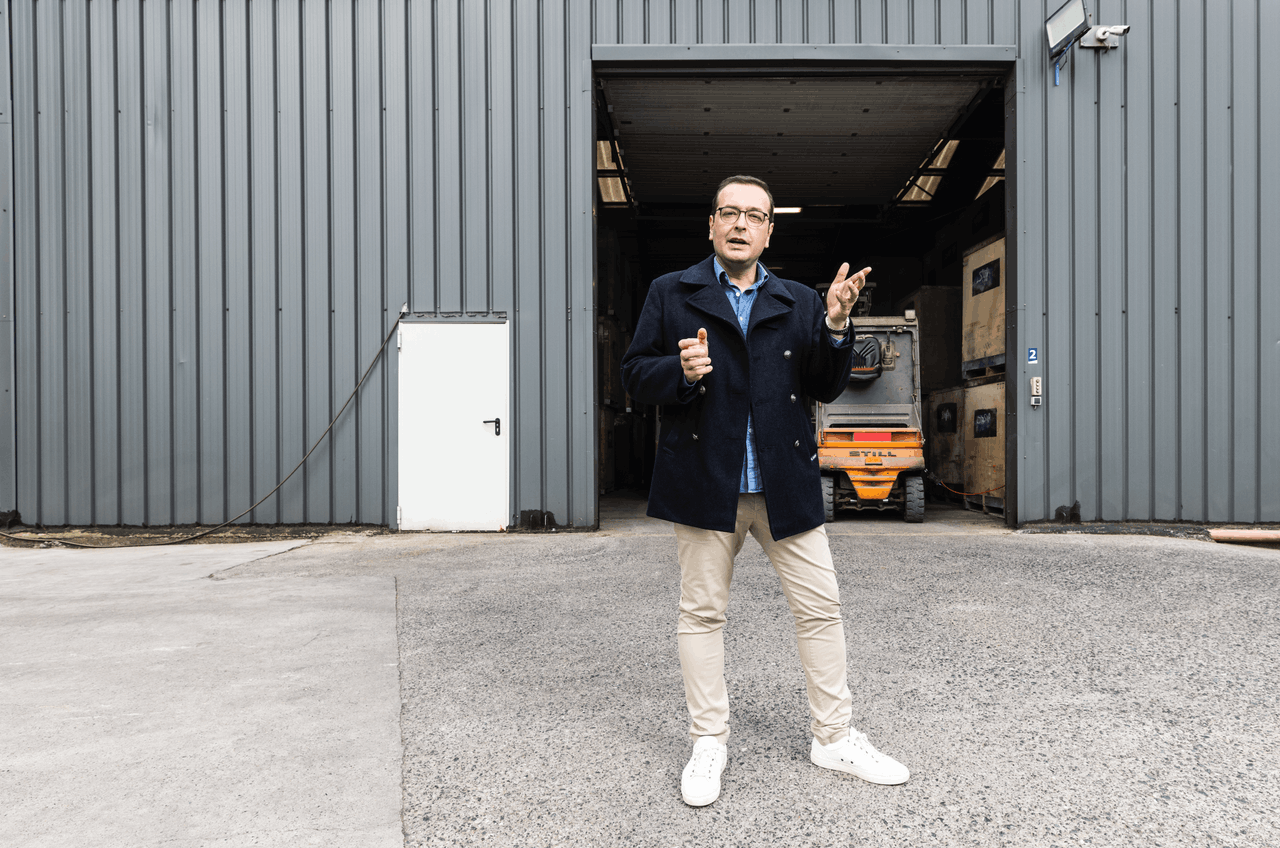1. Right idea, right time
The website easysteelsheds.com--the French version is known as batimentsmoinschers.com (bâtiments moins chers translates as “cheaper buildings”)--is the leading brand of the Steel Shed Solutions group, based in Bertrange.
As well as a success story, it’s a family story: it all began with François Lyonnet, an entrepreneur from the Vosges who frequently visited Eastern Europe, even before the fall of the Berlin Wall. Steel was his thing.
At one point, something crystallised in Lyonnet’s head: there was a need in the Greater Region for metal products--posts, beams, etc.--required by craftspeople and farmers. His son , the current CEO, seized on the idea and founded a startup in 2001. About a decade later Dominique’s brother joined as the sales and marketing director.
“Thanks to a well-chosen URL, and sound SEA and SEO campaigns, we generated leads beyond the borders of the greater region,” Vincent recalls. “And that led us to cover five, ten, then soon 20 countries.” Today they are up to 60 countries, from Europe to Africa and South America, with exports accounting for 99% of the company’s business. “Wherever you are in the world, the needs are the same. As a result, we are able to offer packages covering 90-95% of requirements in the agricultural, craft and equestrian sectors. In France, for example, the ministry of the interior commissioned us to build shelters for their police coaches.”
“We’ve managed to capitalise on a good idea,” he adds, with figures to back it up. Steel Shed Solutions now boasts sales of over €50m (in order intake), up 150% over five years between 2017 and 2022; some 110 employees (80 of whom work in Luxembourg, where the sales and design teams are based, and the others in France for logistics and storage); and 8.5m page views on its websites every year.
2. A “differentiating” approach
easysteelsheds.com makes two commitments: (1) a low price and (2) a strategy that keeps that price low. “It’s the equivalent of a promise,” says Vincent of the low price. He would agree that his company is a bit like Lidl. “There was a time when consumers went [to Lidl] because they didn’t have a lot of money. Today, going to these shops is seen as smart shopping.”

Vincent Lyonnet in front of a building sold by his company in northern Luxembourg. Photo: Guy Wolff/Maison Moderne
Vincent has an anecdote to support his view. It was 2010, shortly after he had joined his brother in the entrepreneurial adventure. A French farmer in the Ariège region had just made a purchase online worth several thousand euros. The farmer’s neighbours, who tended to buy local or from major national firms, were apparently chiding him: “You bought a cheap shed online from Luxembourg?” they said. “You’ve been ripped off!” But when the order arrived a few weeks later and the assembly was complete, they changed their tune.
“How do we manage not to charge extra?” Vincent asks himself. “Because we make savings on operating methods, without giving up anything on quality, such as hot-dip galvanising, which others charge for. Our margins are low, but we make up for it with the volume of business we do.”
Which brings the conversation to strategy. While its competitors canvass the “old-fashioned way,” says Vincent, supported by an army of salespeople deployed in the field, easysteelsheds.com opts instead for an approach that leaves the customer in complete control of their purchase. Nobody approaches them. The site’s reputation and referencing do all the work. “Just imagine, we’re doing e-commerce with 300 or 400 square metre buildings. We’ve shown ourselves to be pioneers.”
The shop window is important, and easysteelsheds.com ensures that it is transparent in every respect. Depending on the type of installation chosen and its surface area, the company commits to prices that are clearly set out on the first page. Meanwhile, says Vincent, their competitors ask you to fill in a large amount of information before issuing a quote. “For equivalent quality, we are effectively the cheapest.”
3. A new organisation
In 2017, the French investment fund Nextstage acquired a stake in the company (although the Lyonnet family still holds a majority stake). This was followed by the arrival of an administrative and financial director, Aurore Henri, who now features in the family photo between the Lyonnet brothers.
“We used to be able to organise a board meeting on a Sunday morning between my brother, my father and myself,” recalls Vincent with a smile. Then Henri arrived. The fit was a good one from the beginning. “We were mutually benevolent. The graft might not have taken, but it did. We looked at who Aurore was and what she could bring to the table. It turned out that we were yin and yang. We complement each other very well. Aurore has her own prerogatives. She takes us further.”
Under this leadership, the group is currently working on structuring its teams in order to “bring out the best,” recruit new talent and develop its processes. With 3,500 transactions carried out each year, “the managers also need to develop their skills,” says Vincent.
Their aim? “To consolidate what we have achieved on the European market and to find additional outlets, by moving into new territories with an expanded offering.” The emphasis is on increasingly elaborate packages (without losing clarity or ease of access), incorporating not only the equipment needed to erect the building ordered (the base), but also support in applying for planning permission, financing, erecting the hangar or finding professionals to install photovoltaic panels, for example.
This article in French.
